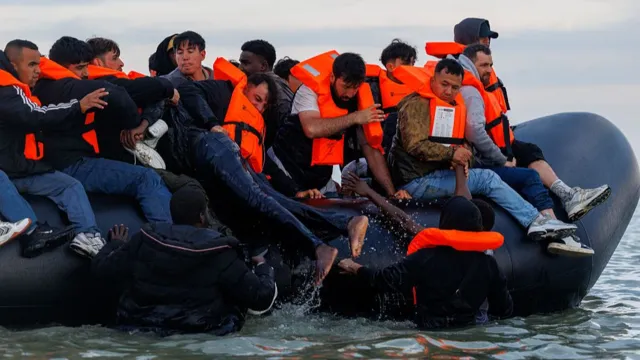The number of migrants who have crossed the English Channel in small boats since Labour assumed power last summer has now exceeded 50,000, according to official data.
Figures from the Home Office show that as of Monday, 50,271 people had made the journey, with 474 arriving on that day alone.
French authorities also confirmed that a female migrant died on Monday while attempting to board a boat bound for the UK.
Government minister, Baroness Smith, told the BBC the figure was “an unacceptable number of people” but stressed that the “one in, one out” returns agreement with France would act as a deterrent.
The deal allows the UK to send some migrants back to France in exchange for receiving the same number of asylum seekers with credible claims.
The Conservative Party seized on the milestone, accusing Labour of having “surrendered our borders.”
Baroness Smith acknowledged public concern, saying, “We understand how concerning this is to people.” She added that the figures reflect how people-smuggling gangs have “taken an absolute foothold in the tragic trafficking of people” in recent years, but insisted the government was “making progress” in tackling the problem.
Under the pilot scheme with France, several dozen migrants have so far been detained, according to a government source, though no exact number has been given.
The first returns are expected within weeks, but officials warn initial figures will be small.
Data released on Tuesday confirmed that from Labour’s first day in power on 5 July 2024 to Monday, 11 August 2025, more than 50,000 people had crossed in small boats, over 13,000 more than in the same period a year earlier, when 36,346 made the journey.
However, government officials noted that this is not unprecedented. Between 8 October 2021 and 14 November 2022, under the Conservatives, there were 53,587 arrivals over a similar 403-day period.
They also pointed to unusually calm and warm weather earlier this year as a factor in the high numbers.
Despite that, the Tories argued Labour was presiding over “the worst illegal immigration crisis in our history.”
Shadow home secretary Chris Philp claimed, “This is a taxpayer-funded ferry service for the people-smuggling trade. Every illegal immigrant should be removed immediately upon arrival.”
Reform UK leader, Nigel Farage, added, “As I predicted five years ago, unless we deport illegal migrants the invasion will be huge. 50,000 since this weak prime minister took office and there is no sign of it stopping.”
The Home Office said it remains committed to ending dangerous Channel crossings and has developed a “serious plan” to dismantle smuggling networks.
But the political optics of the 50,000 milestone are challenging for the government, which had promised to “smash the gangs” driving the crossings.
So far in 2025, more migrants have crossed between January and August than in the same months last year. Cumulative data shows that by 10 August, 26,555 people had arrived, the highest for that point in the year compared with any of the previous four years.
While stressing there is “no silver bullet” to the problem, government sources said measures to combat illegal working and speed up deportations of foreign criminals form part of a broader strategy.
The Border Security, Asylum and Immigration Bill currently before Parliament would, Baroness Smith said, give ministers more powers to “challenge the gangs.”
Other plans include prison terms of up to five years for criminals promoting Channel crossings online and increased funding for National Crime Agency officers.
Responding to Tory claims that the “one in, one out” deal will only lead to small numbers being deported, Baroness Smith pointed to the Conservatives’ Rwanda policy, “The previous Conservative government’s Rwanda deportation scheme cost £700m and was never designed for more than six people a week.”
The debate comes amid protests and counter-protests outside UK hotels housing asylum seekers.
Enver Solomon, chief executive of the Refugee Council, stressed that “people do not cross the Channel unless what lies behind them is more terrifying than what lies ahead.”
He said many travelling in small boats are “often fleeing places like Sudan, where war has left them with nowhere else to turn.”
“To stop smugglers for good, the government must expand safe and legal routes, such as allowing family members to travel to be with their loved ones who are already settled in the UK,” Solomon said. “Without these measures, desperate people will continue to take dangerous journeys, and the criminal gangs are likely to simply adapt their approaches.”
